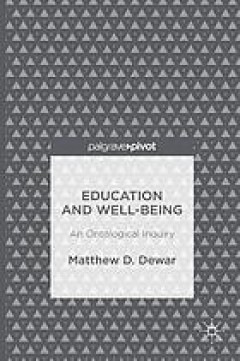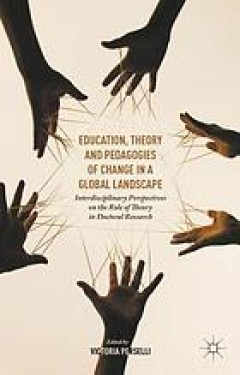Filter by

Education and Well-Being An Ontological Inquiry
This book explores how contemporary educational research and curriculum occlude the vital and enduring relationship between education and well-being. Beginning with the consequences of the reductive tendencies of educational research and moving through the consequences of the technical and instrumental tendencies of curriculum, this book challenges how contemporary education as a whole reduces …
- Edition
- -
- ISBN/ISSN
- 9781137602756
- Collation
- xxii, 116 pages ; 22 cm
- Series Title
- -
- Call Number
- 370.1

Education, Theory and Pedagogies of Change in a Global Landscape Interdiscipl…
Where does theory come from in educational research - and how is it operationalized in diverse, interdisciplinary contexts and professional settings? This volume examines the places and spaces of theory in the work of nine pre- to post-doctoral scholars, whose narratives transport us across a wide range of interdisciplinary themes and fields of inquiry from Irigaray on mothering in higher educa…
- Edition
- -
- ISBN/ISSN
- 9781137549235
- Collation
- xv, 223 pages
- Series Title
- -
- Call Number
- 370.1

Ethics, Law and Governance of Biobanking National, European and Internationa…
Biobank research and genomic information are changing the way we look at health and medicine. Genomics challenges our values and has always been controversial and difficult to regulate. In the future lies the promise of tailored medical treatments and pharmacogenomics but the borders between medical research and clinical practice are becoming blurred. We see sequencing platforms for research th…
- Edition
- -
- ISBN/ISSN
- 978-94-017-9573-9
- Collation
- VIII, 277
- Series Title
- -
- Call Number
- -

Ethics, Economics and Social Institutions
The book highlights the ethical aspects and issues that are inherent to economics in the context of today’s prominent social institutions. It reviews a range of problems concerning dominant social institutions, namely markets, government agencies, corporate entities, financial networks, and religious systems. Further, in each case, the book takes a detailed look at the economic problems as th…
- Edition
- -
- ISBN/ISSN
- 978-981-10-0899-3
- Collation
- 4 illustrations in colour
- Series Title
- -
- Call Number
- -

Ethics and the Archaeology of Violence
This volume examines the distinctive and highly problematic ethical questions surrounding conflict archaeology. By bringing together sophisticated analyses and pertinent case studies from around the world it aims to address the problems facing archaeologists working in areas of violent conflict, past and present. Of all the contentious issues within archaeology and heritage, the study of confli…
- Edition
- -
- ISBN/ISSN
- 978-1-4939-1643-6
- Collation
- 2 b/w illustrations, 13 illustrations in colour
- Series Title
- -
- Call Number
- -

Ethics and Science Education: How Subjectivity Matters
This book encapsulates a line of research that looks at how students are positioned as ethical actors/decision makers in biology education by science policy, curriculum, and classroom resources. Its basis comes from a textbook study that examined how biology texts work to constitute subjectivities related to neoliberalism and global capitalism, sex/gender and sexuality, and ethics. The study fo…
- Edition
- -
- ISBN/ISSN
- 978-3-319-39132-8
- Collation
- 1 illustrations in colour
- Series Title
- -
- Call Number
- -

Ethics and Archaeological Praxis
Restoring the historicity and plurality of archaeological ethics is a task to which this book is devoted; its emphasis on praxis mends the historical condition of ethics. In doing so, it shows that nowadays a multicultural (sometimes also called “public”) ethic looms large in the discipline. By engaging communities “differently,” archaeology has explicitly adopted an ethical outlook, pu…
- Edition
- -
- ISBN/ISSN
- 978-1-4939-1646-7
- Collation
- 4 b/w illustrations, 6 illustrations in colour
- Series Title
- -
- Call Number
- -

Ethical Engineering for International Development and Environmental Sustainab…
Ensuring that their work has a positive influence on society is a responsibility and a privilege for engineers, but also a considerable challenge. This book addresses the ways in which engineers meet this challenge, working from the assumption that for a project to be truly ethical both the undertaking itself and its implementation must be ethically sound. The contributors discuss varied to…
- Edition
- -
- ISBN/ISSN
- 978-1-4471-6618-4
- Collation
- 28 b/w illustrations, 12 illustrations in colour
- Series Title
- -
- Call Number
- -

Ethical Dimensions of Muslim Education
This book draws upon ethical dimensions of Muslim education as a means through which to address contemporary issues, such as social and societal conflicts, exclusion and marginalisation, and violence. It argues that an ethical Muslim education is underscored by the practice of autonomous, critical and deliberative engagement that can engender reflective judgement, compassionate recognition and …
- Edition
- -
- ISBN/ISSN
- 978-3-319-29317-2
- Collation
- XXX, 162
- Series Title
- -
- Call Number
- -

Ethical Counselling and Medical Decision-Making in the Era of Personalised Me…
This book offers an overview of the main questions arising when biomedical decision-making intersects ethical decision-making. It reports on two ethical decision-making methodologies, one addressing the patients, the other physicians. It shows how patients’ autonomous choices can be empowered by increasing awareness of ethical deliberation, and at the same time it supports healthcare professi…
- Edition
- -
- ISBN/ISSN
- 978-3-319-27690-8
- Collation
- 4 illustrations in colour
- Series Title
- -
- Call Number
- -
 Computer Science, Information & General Works
Computer Science, Information & General Works  Philosophy & Psychology
Philosophy & Psychology  Religion
Religion  Social Sciences
Social Sciences  Language
Language  Pure Science
Pure Science  Applied Sciences
Applied Sciences  Art & Recreation
Art & Recreation  Literature
Literature  History & Geography
History & Geography